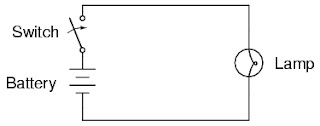Voltage - part [1]
What is voltage?
Definition:
Voltage, electric potential, electric pressure or electric tension is the difference in electric potential between two points, In other words, Voltage is a force provided by a power source that pushes electrons through a conducting circuit enabling them to apply this energy in another form (illuminating a light, moving motor, etc...).
We can use Voltameter to measure the voltage (or potential difference) between two points in a system.
Here`s an example of Voltage in a direct current (dc) circuit:
- in this circuit, if we open the switch (switch turned OFF) the circuit will be no longer close so no current flows and the lamp won't illuminate.
- in otherwise, If we close that switch (switch turned ON) the circuit will be a closed circuit
- which allows voltage to push electrons (current ) through this closed loop from the negative terminal of the battery to the positive terminal of it
- When electrons reach the lamp (what we call current) the lamp convert that charge into a light which will make it glow.
- then electrons back again to the source (battery)
so if electrons that come out from a battery return back again to it (why the battery have a limit time?)
-simply we need to know the difference between current and voltage, then it will be easy to understand why we are doing that.(we just said that voltage is a force or pressure we need to apply to move electrons through our circuit and that is simply the answer, the voltage is an energy we are saving in a power source, so moving electrons in our circuit uses that force which is depending on the load(R).-that force has a limit which indicates the limit of our source so 9v batteries have more time than 11v batteries [in case your load is the same].



Comments
Post a Comment